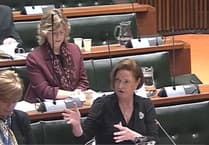Each year, children’s charity the Fostering Network organises Foster Care Fortnight, celebrating the work of the UK’s foster carers and raising the profile of fostering across the country.
Figures from the Department for Education show there were 609 fostered children in Devon at the end of March 2021 – the highest number for at least a decade.
Separate figures from Ofsted, which cover placements organised by local authority, show around 450 households offered to foster – including around 125 newly-approved households in the latest year.
Around a third of all fostering households in England are found by independent fostering agencies, which are not included in Ofsted’s figures.
Children’s charities have used Foster Care Fortnight to talk about the positive impacts of fostering on both children and carers.
Andy Elvin, CEO of the Adolescent and Children’s Trust, an organisation which matches children with placements, said foster parents describe the experience as “incredibly rewarding.”
But although there were more than 7,000 vacant places across England in March last year, including around 65 in Devon, Mr Elvin warns the charity has been struggling to find homes for teenagers in particular.
“There is a misconception that teenagers who are in foster care are difficult, that they are in care because of something that they have done – but this is not the case.
“Like all children in foster care, regardless of their age, teenagers are in need of a safe, secure home and carers who can see their potential and help them to achieve it.”
There were some 57,330 children receiving foster care across England as of the end of March 2021.
Across the country, around 6,070 households were approved by local authorities to foster in the year to March 2021 – but the Fostering Network estimates that close to 8,000 more fostering families are needed, including 722 in the South West alone.
Chief executive, Kevin Williams, says people should not be dissuaded from fostering by thinking they aren’t the right fit for it.
“If you have ever considered fostering, now is the time to get in touch with your local fostering service and find out more.
“The fostering community is open to people from all walks of life and backgrounds: you can become a foster carer no matter your age, gender, relationship status or sexual orientation.
“Foster carers are the bedrock of children’s social care. They are vital in our society and our young people rely on their care, dedication, passion and skills to support them when they need it most.”




-Oscar-(special-mention)-Kingsbridge-Primary-School-28-11-25.jpg?width=209&height=140&crop=209:145,smart&quality=75)
Comments
This article has no comments yet. Be the first to leave a comment.